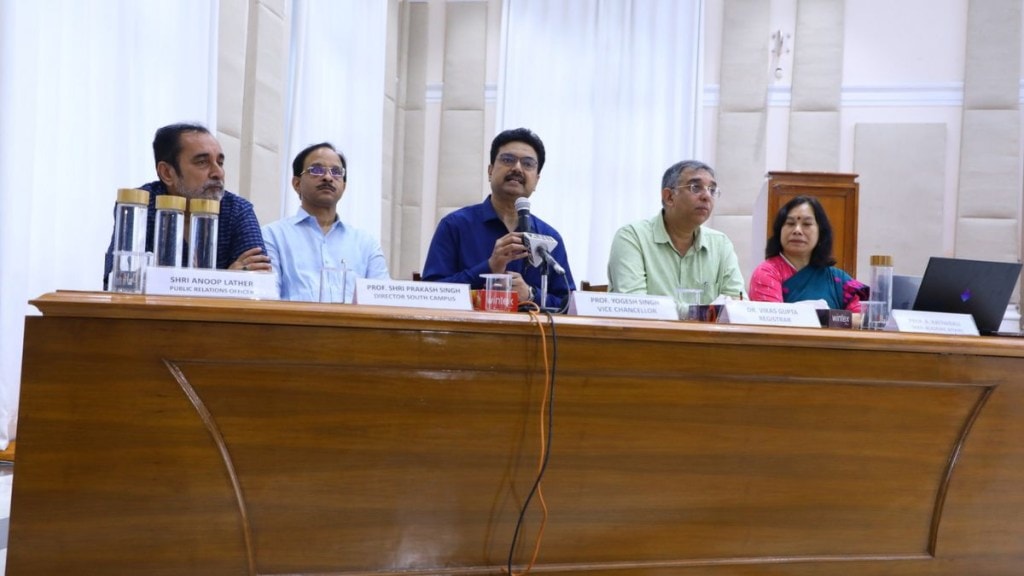Delhi University (DU) vice chancellor Yogesh Singh said that the university is ready to provide all help to the students who are victims of Manipur violence.
“University of Delhi is ready to provide all possible help to all such aggrieved students. If any student has any problem then they can contact DU administration. We are ready to help in any way. If there is a need to make some provisions separately, the university will try to make them,” Singh said in a press conference on the completion of three years of National Education Policy (NEP) 2020.
On this occasion, the vice chancellor also enumerated the achievements of University of Delhi so far regarding NEP 2020. He informed that University of Delhi has implemented NEP 2020 at the undergraduate level through the Undergraduate Curriculum Framework 2022 (UGCF) from the academic session 2022-23. He informed that UGCF 2022 has been designed in such a way that it gives flexibility to the students to develop their academic path with a multidisciplinary approach. With emphasis on research and innovation, it provides for holistic and skill based education. Its purpose is to develop analytical and creative thinking. UGCF 2022 includes provisions for internship, apprenticeship and project and community outreach.
The vice chancellor said that a lot of work has been done on the format and regularisation of NEP, and now its second phase is starting. He said that in NEP 2020, the idea has been promoted that all the institutes should be degree awarding. However, at present it is a big challenge. Its implementation will take time. But slowly work is being done on this.
Furthermore, he said that NEP has been accepted by all with open mind and teachers are also fully prepared for it. Studies have started under UG Curriculum Framework 2022. Now further work will be done on PG Curriculum Framework.
In response to a question, the vice chancellor said that if a student comes from any other university after passing three-year UG programme, he will get admission in two-year PG programme in University of Delhi and those who join after four-year UG programme, they will get admission in one year PG programme. He informed that MoUs are also being signed with foreign universities and plans are being prepared for joint degree programmes.
Commenting on introducing 22 Indian languages in the University of Delhi, the he said that teachers of these languages would be added, if there are students who wish to study these. For this, clusters of colleges have also been made according to the plan, so that students can be taught jointly in case of a less number of students in any course in a college.
.
The vice chancellor informed that registration has also started for the Competency Enhancement Scheme, a scheme launched by the University of Delhi. Under this scheme any citizen can take admission in the existing programmes of DU to enhance their skills. He said that any person who fulfils the specified minimum eligibility criteria and pre-requisites, if any, for an existing course can register for that course, subject to the availability of seats. Applicants below the age of 60 years will be admitted on the basis of essential qualification of the course. Admission for senior citizens will be on the basis of merit and age, where merit and age will be given weightage of 70% and 30% respectively. The number of seats in a course shall be a maximum of 10% of the total class strength of that course or six seats, whichever is less. He told that these seats will be considered as additional under CES in any course.
Additionally, DU’s dean of Academic Affairs K.Ratnabali said that the University of Delhi has started 675 multidisciplinary courses under UGCF 2022 while under Samagra Shiksha, 109 courses of skill education have been included. There is a provision for Certificate/Diploma/Degree/Honors Degree after each year in the four year programme. Provision for lifelong learning, up-skilling and re-skilling has also been made in the education policy. The range of vocational courses includes courses like aquaculture entrepreneurship, fish farming, manufacturing of fish feed, fish breeding and larval rearing, ornamental fish production, bio-floc technology and pearl production, among the list of vocational courses.
